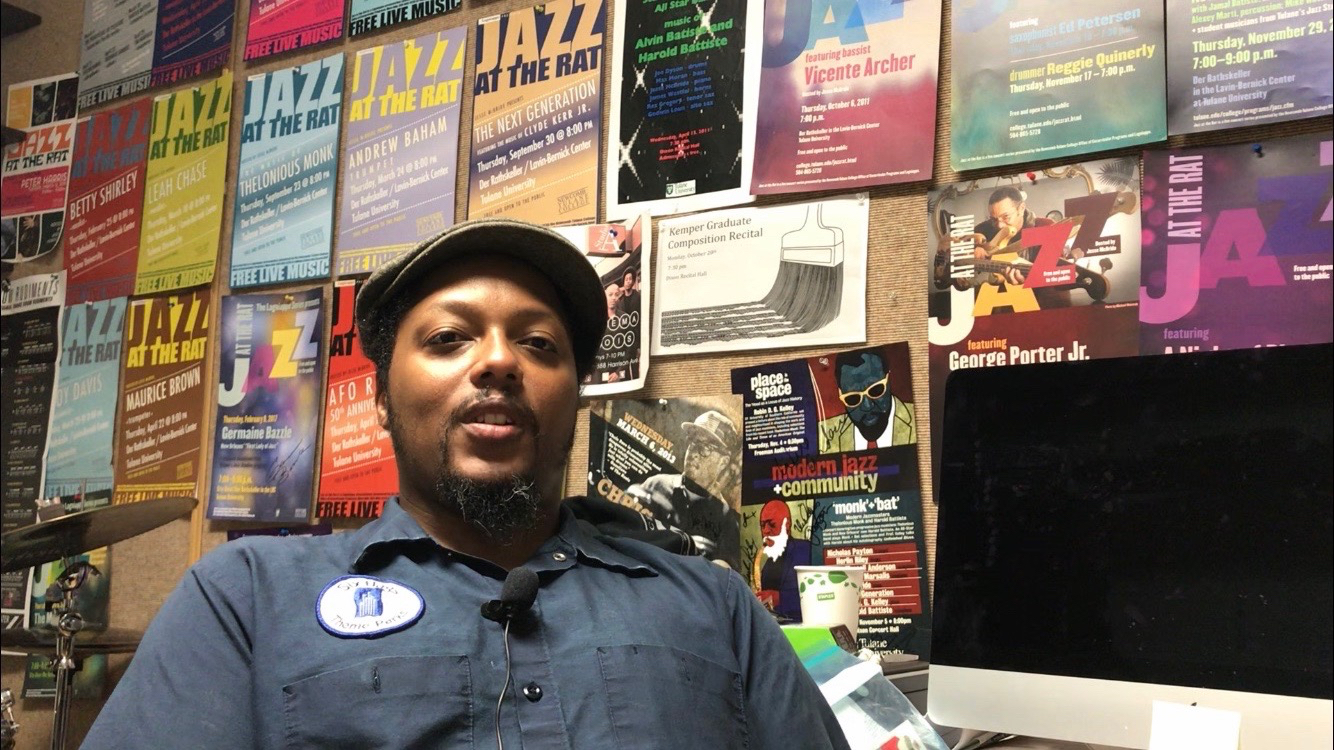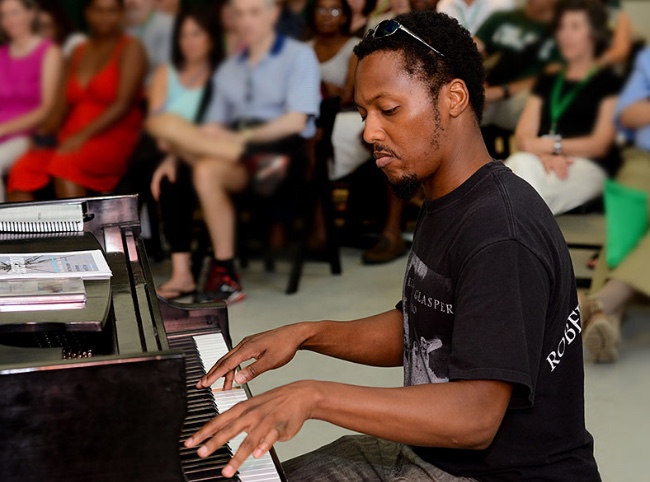Editor’s Note: The following series “All about Jazz” is a week-long series curated by Rena Repenning as part of the Digital Research Internship Program in partnership with ViaNolaVie. The DRI Program is a Newcomb Institute technology initiative for undergraduate students combining technology skillsets, feminist leadership, and the digital humanities.
Yes, this is the time when we’d be swarmed with floral shirts, drinking mango freezes, and sweating to our favorite beats in the sun, but due to COVID-19, the annual New Orleans Heritage & Jazz fest is postponed until Fall 2020. However, that doesn’t mean we all won’t be getting down and dancing in our living spaces. WWOZ will broadcast for 8 days-8 hours each (11am-7pm), the same days and hours as the originally-scheduled Jazz Fest (April 23-26 and April 30-May 3). So turn up the volume and get down to our Nola sounds! To also get you in the mood, we are bringing you a virtual Jazz Fest from the fests of the past. Originally starting in 1970, Jazz Fest is a staple in New Orleans culture and showcases musicians and talent, new and old. Happy Jazz, everyone, and we can’t wait to dance with you again in the hot hot sunshine (and pouring down rain, of course!)
This article was originally published on 7/28/19.

Jesse McBride is the well-known pianist and leader of the jazz ensemble “The Next Generation” founded by jazz legend Harold Battiste. They have performed in all the city’s famous clubs. By day, McBride is a professor at Tulane University where he teaches the next generation of jazz pianists. He is also the founder of Tulane’s unique jazz series, Jazz at the Rat. He has a unique perspective on the past and future of jazz in New Orleans.
McBride was brought into music by his mother, a retired band director, and his aunt, Dr. Anne Lundy, a conductor, and strings teacher. She also had a non-profit that she helped start in Houston — the Community Music Center of Houston. In high school, he played football but later realized that his true passion was music. Later, at the University of New Orleans, McBride was empowered in jazz by the greats before him like Ellis Marsalis, his teacher at UNO.
The list of his first teachers and mentors in his early years in New Orleans is filled with jazz greats and legends including Ellis Marsalis, Harold Batiste, Clyde Kerr, and Alvin Batiste.
“I’d be by far the youngest person with all those cats who were the epitome of New Orleans excellence and professionalism,” says McBride. “I always felt privileged just to be in their presence. Over time I started practicing more and understanding what I needed to do to as they say, ‘make the gig’.”
Now, McBride has undertaken the mission to teach the next generation of jazz pianists at Tulane University.
This is even more important post-Hurricane Katrina. He says the displacement of musicians after Hurricane Katrina has had a lasting effect on the city’s jazz scene. The once incredibly high “standard” is now less competitive and allows musicians to play who at one time would never have been hired.
“Just about every gig that I went to pre-Katrina was inspiring. There are a lot more venues and a lot more musicians here, but the quality is not as high. That’s the biggest difference for me. The standard — the cats that were here before Katrina know what the standard is,” says McBride. “There’s still plenty of bad cats here, but it’s not per capita the same. You couldn’t get a gig unless you could play, pre-Katrina. Now anybody can come here and get a gig.”
With his students at Tulane, he is trying to raise the bar and expose them to the standards he was held to as a young jazz musician in New Orleans. At the Jazz at the Rat series at Tulane, students learn to play under pressure and also get to play with experienced musicians.
“When you’re a freshman, and you don’t know anybody in New Orleans, and you’re not from New Orleans, and you’re really not that good, it’s a place for you to have a go. You say ‘okay, I have to learn these three songs and I play these three songs on this day to the best of my ability in front of these people with the combo that I’m in.’”
McBride sees his work at Tulane as a way to infuse the high standards of New Orleans pre-Katrina into the next generation of jazz musicians. He looks for students to mentor and to encourage. His goal is to get them to embrace the standards of the great musicians who he learned from and was inspired by.

Photo Credit: Tulane University
Another important way McBride exposes students to jazz legends is Tulane’s treasure of jazz recordings. He is known to take his students to the Hogan Jazz Archives to connect them with the foundational leaders of jazz.
“They allow me to put the record on the player, and they know that I know how to use a record player because that’s kind of a lost art as well. It’s an archive, so you don’t want to destroy anything in there. You really have to be careful with the record, so that’s another detail that the student has to learn and observe,” he says.
“You have to be careful and cognizant of the importance of the art. Part of the art is the recording because if those records are destroyed — a lot of those records masters have already been destroyed.
His office walls are covered in photographs of jazz legends and Jazz at the Rat posters. In the middle of the interview, he took a call from a young musician and arranged to jam that night. He is always about continuing to be a part of the bridge from the old greats of New Orlean’s jazz to the next generation. Appropriately, that is the name he took for his own group. When asked about the future of jazz, and what he sees as the best song, he responds that he prefers to talk about the best jazz artist.
“The cat now is Nicholas Payton. He’s the greatest musician on the planet Earth right now. I’m not saying that in hyperbole,” says McBride. “You’d have to know his skill set you know. He can play any instrument. He can write for any instrument.”
Perhaps one day one of Professor McBride’s students will fill his shoes and lead the next generation to reestablish the standard in New Orleans. Until then, his pupils will continue to learn by that standard and hope to play in the post-Katrina era of New Orleans jazz.
In a wide-ranging interview, McBride talked about the unique Tulane jazz series Jazz at the Rat; the changes in jazz in New Orleans post-Hurrican Katrina; and his visits to the Hogan Jazz Archives at Tulane, including talking about the lost art of using a record player. This video also includes clips from a recent night at Jazz at the Rat where Tulane students performed. View the highlights from Jazz at the Rat and McBride’s interview here:
 NOLAbeings Multimedia artist Claire Bangser created NOLAbeings as a portrait-based story project that marries...
NOLAbeings Multimedia artist Claire Bangser created NOLAbeings as a portrait-based story project that marries...  Voodoo in New Orleans: Reviving history: New Orleans fortune telling This article takes a deep dive into the history of Voodoo in New Orleans, its hybridization with Catholicism, and its present-day place in the city's culture. The author visits fortune-tellers in the French Quarter, using their guidance as a tool for introspection rather than a deterministic predictor of the future. Through her experiences in New Orleans, the author feels a mystical connection to both the past and the future.
Voodoo in New Orleans: Reviving history: New Orleans fortune telling This article takes a deep dive into the history of Voodoo in New Orleans, its hybridization with Catholicism, and its present-day place in the city's culture. The author visits fortune-tellers in the French Quarter, using their guidance as a tool for introspection rather than a deterministic predictor of the future. Through her experiences in New Orleans, the author feels a mystical connection to both the past and the future. 